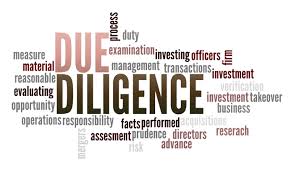 You may have heard about “due diligence” when a business is being sold or taken over and wondered what it meant. If you want to sell or buy a business of your own you’ll certainly need to know just what due diligence means and how it’s applied.
You may have heard about “due diligence” when a business is being sold or taken over and wondered what it meant. If you want to sell or buy a business of your own you’ll certainly need to know just what due diligence means and how it’s applied.
In its simplest form due diligence is a comprehensive process that investigates a business to assure the intending purchaser that all facts and financial figures are as stated by the vendor and that there are no unpleasant and unwanted surprises that have been concealed.
This process of due diligence is usually conducted by the purchaser’s accountant and legal advisors, who may also call in specialists for matters relating to stock or capital equipment, among other possible areas under examination.
The sale of a retailer, for example, might require an expert in that particular line of goods to gain an accurate valuation of the stock in the business. The purchaser of a manufacturing business would want to be sure that the equipment is in good condition and has been suitably maintained.
Due diligence is a part of every business sale or purchase, regardless of the size of the enterprise. The more complex the business is, the longer the due diligence is likely to take, but today’s purchasers shouldn’t even contemplate buying a business until due diligence has been completed.
Is it a Good Business to Buy?
Due diligence is conducted to answer a number of questions, including whether the timing is appropriate for the purchaser to buy and why the vendor is selling the business. Some businesses have peaked and are starting to slide which might make them affordable but also means they aren’t capable of improvement and represent bad investments for purchasers.
Due diligence examines the market for the products sold by the business and determines their positions in the life cycle of each product. It looks at the marketplace to find signs of saturation, or to locate opportunities the new owner can exploit.
The Finances of the Business
Every business for sale comes with claims of turnover, expenses and profitability, but how can the purchaser know that these are accurate representations? Due diligence inspects the books of the business including tax records for at least the previous three years to validate or challenge claims by the vendor.
Due diligence will also look for details of how capital equipment was acquired to ensure that the ownership status is as claimed and no outstanding loans or charges over the equipment exist.
Who Buys from the Business?
Many businesses are highly dependent on a small number of large customers. The departure of just one of these can be a serious problem, and the purchaser needs to be certain that existing customers will stay after the sale of the business.
Due diligence will examine all existing contracts and sales agreements, and if necessary introduce new agreements to carry customers over to the new owner. It will also verify claimed purchase levels of key customers and evaluate their growth potential if required.
The Condition of the Premises
The acquisition of most businesses involves taking over premises, usually ones that have been leased by the former owner. The due diligence process looks at the condition of the premises so that the purchaser isn’t stuck with expensive repairs, and investigates the terms of the lease to ensure it’s sufficiently long and the rental amount is appropriate.
Another critical factor that relates to the premises is its location. Is it in an area that’s affected by high crime rates or high volumes of heavy transport? Does it permit parking for employees who drive to work, and can customers access the premises easily if they want to?
Compliance with all Applicable Legislation
Every business requires a number of permits and licenses to operate; issuing authorities can range from local governments to the State and Federal Government. Lack of proper licensing can lead to the closure of the firm or at least to expensive legal action and possible fines.
Due diligence will identify all those permits required by the business being offered for sale and ascertain whether the company is in full compliance. It will also examine proposed or pending legislation to ensure that no changes to the regulatory environment will affect the business.
The People
People are essential to most businesses. Due diligence examines the staffing of the enterprise and whether the people now in the business will remain there under the new owner. It also considers any need for redundancies of existing staff and the estimated cost to the business.
The process of due diligence can be extended to the preparation of contracts and workplace agreements for staff to keep them with the business after the transfer of ownership.
One of the most important areas of due diligence is to look at the importance of the previous owner to the operation of the business. Is that person essential to the firm’s success? Will the new owner’s skills be sufficient to continue trading as before? Some businesses are so technology dependent that when the former owner departs they will be unable to survive.
Intellectual Property
A businesses’ IP can include patents, trademarks, copyrighted materials and even customer lists and sales records. In most transfers of ownership the new owner acquires the rights to this IP and it remains with the business.
Due diligence will establish the validity of all intellectual property that is included in the sale and ensure that it is transferred along with the other assets being bought by the purchaser.
Due diligence will establish whether the outgoing owner will The Period of Transitionremain with the business for a period of time to assist the new owner, and determine a length of time in which the previous owner is “locked out” of competition with their former firm.
It can also set a period of time for the incoming owner to run the business on a ‘trial’ basis while all the financials can be checked out and the outgoing owner introduces customers to the new owner.
Due diligence is an essential yet flexible process that every purchaser needs to understand and incorporate into the acquisition of a business. It can take place after an offer has been made and accepted, or it can be used to help the purchaser determine the most appropriate price to pay for the business.
Copyright 2005, RAN ONE Inc. All rights reserved. Reprinted with permission from www.ranone.com

 Chris’ combination of academic credentials, career experience and temperament ideally suit his calling as a business development advisor. Clients say he has a mind for business and a heart for service.
Chris’ combination of academic credentials, career experience and temperament ideally suit his calling as a business development advisor. Clients say he has a mind for business and a heart for service.